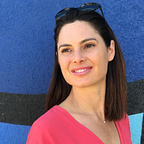After a festive Christmas morning with my husband and three young kids, I got an email with bad news. One of the staff had tested positive at the childcare centre where my kids had spent the day on December 23.
Before having my mom over for dinner, we busted out our stash of rapid antigen tests and swabbed all three kids. I thought it was a long shot to catch it this early, yet knew that Omicron had a reputation for being fast. My twin six-year-old girls were negative (phew!), but my ten-year-old son’s test had a very faint band. You really had to squint to see it.
A second test, with a different brand, also showed a faint band. At that point, I assumed the worst — that we had caught the virus on the cusp of takeoff. Hubby wasn’t convinced and wondered if it may be a false positive. We erred on the side of caution and called off Christmas dinner. We also began treating our son as if he were positive, taking as many precautions as we could, including masks and distance in shared spaces at home.
Sadly, I was right (normally, I’d celebrate, but not this time). We re-tested the next…
